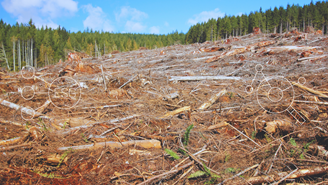Celebrating a diversity of approaches to sustainable investing
I recently traveled from the US to Europe to learn about the major market differences in sustainable investing. For context, investors long rooted in sustainable investing practices have viewed the general US market as lagging compared to Europe. As it pertains to values-based investing, I agree. However, the US has embraced ESG integration in a very sophisticated and pioneering way as it relates to risk mitigation.
Regulating the Chemicals Industry: How does REACH impact Companies?
Chemical substances are part of our daily lives. They are found everywhere from the cleaning detergents we use to the clothes we wear and our personal electronics. The companies that produce these chemicals, some of which can be hazardous and have a negative impact on human health and the environment, are exposed to several risks and are highly regulated. In Europe, the Registration, Evaluation, Authorisation and Restriction of Chemicals (REACH) regulation focuses on ensuring the safe use of chemicals, as well as the phasing-out of the most harmful chemical substances. As the third and final REACH registration deadline approaches, we take this opportunity to look at the impact of chemical regulations on the sector and investors.
Earth Day 2018: Rethinking Plastic Globally
Earth Day 2018 is focused on ending plastic pollution and “fundamentally changing human attitude and behavior about plastics.” Although more work is needed, some positive change is already happening. In this blog article, we examine some of the impacts of plastic pollution on our oceans, the regulatory and industry developments being implemented to curb it, and the role investors can play to reduce plastic ocean waste.
Transition Risk for Oil & Gas Companies: Addressing the Disclosure Gap
As the world transitions towards a low-carbon economy, investors are increasingly interested in how oil and gas companies plan to address related risks. Most companies in the industry recognize that their business is exposed to risks related to carbon regulations, decreasing demand for its products, or increasing costs related to the implementation of emission reduction technologies. However, when it comes to addressing these risks, disclosure is limited (as we noted in our July 2017 blog post on the Task Force for Climate-Related Financial Disclosures [TCFD]). Oil and gas companies will have to increase and improve their disclosure if they want to convince investors of the viability of their business model in a carbon-constrained world.
Whole Risk, Whole Opportunity: The ESG implications of Amazon’s Whole Foods Acquisition
Amazon’s expansionism has brought it into multicategory retailing, consumer electronics, cloud computing, logistics and media production. Now, with its recent USD 13.7bn acquisition of Whole Foods Market, it strides into brick-and-mortar grocery retailing. As Amazon expands in all directions, so does the frontier of its ESG risks and opportunities. How do grocery stores fit into Amazon’s customer-obsessed technocracy? And how will it use the Whole Foods brand, built on a foundation of upmarket ethical consumerism?
Will the Consolidation in the Chemical Industry change its ESG Risk Profile?
When the stock market closes today, the DowDuPont merger will officially be finalized and the new entity will start trading under the ticker DWDP (as of September first). This is the most recent – and certainly one of the most significant – mergers in an industry that has seen unprecedented consolidation. But what are the social and environmental ramifications of this consolidation and does it risk changing the industry’s ESG risk profile?
What will the TCFD mean for Oil and Gas Producers?
Building on the momentum created by the “Aiming for A” resolutions and the Paris Agreement, the Task Force on Climate-related Financial Disclosures (TCFD) published its recommendations for disclosing climate-related risks in June. How will these new guidelines affect the oil and gas industry and can investors leverage them in their engagement efforts?
What ESG Issues will Investors Face as the Electric Vehicle Market Gears up?
On 2 July 2017, Elon Musk tweeted that the first Model 3 would be delivered by the end of the month and that Tesla plans to ramp up production to 20,000 units by December. The announcement is a strong indication that the electric vehicles (EVs) revolution may be approaching faster than expected, driven by a favorable combination of political, technological and market trends. This is certainly a positive development, however, even in the world of clean tech, environmental, social and governance (ESG) issues abound. Companies and investors alike will need to manage related risks carefully.
Sizing up the US withdrawal from the Paris Agreement
President Trump’s announcement last week that he will pull the US out of the Paris Agreement is unlikely to have any meaningful impact on clean energy transition. This is because the global pivot to renewable energy is increasingly being driven by economic fundamentals, not policy (an argument we made in our deep dive of the Paris Agreement in January 2016).
Dieselgate: Opening a New Era for the Auto Industry?
On 23 May 2017, German prosecutors raided Daimler AG’s offices in Stuttgart as part of their investigation into alleged emissions fraud. The company’s shares have since tumbled 4.3 percent. Daimler’s experience is the latest reminder that investing in clean technologies is money better spent than paying penalties for non-compliance in an increasingly stringent regulatory environment.
Palm Oil’s Evolving ESG Risk Profile: Can Issuers Cope?
The use of palm oil has become commonplace in packaged food and personal care products. This ubiquity is stimulating the rapid growth of the market. While this growth is creating several opportunities for investors, it is also exposing them to a growing number of ESG risks.
Waste Not, Want Not – Water Use in the Semiconductor Industry
This year’s theme for World Water Day is wastewater. It was aptly chosen given the United Nations’ prediction of a 55% increase in global water demand by 2050 (compared to 2000). To meet this demand, companies will need to manage (waste)water far more efficiently than they do today. The risk of failing to do so becomes concrete when you look at a water-intensive industry such as semiconductors.
Why Responsible Investing is in our DNA
– Celebrating Sustainalytics’ 25th anniversary. This year Sustainalytics turns 25. It is an important event to celebrate, but, for me, the true value of such milestones lie in the fact that they give you pause to reflect. While Sustainalytics is a success story, it doesn’t mean we didn’t have some peaks and valleys. At any rate, I ask myself how we were able to create a company that has built responsible investing into its very DNA.



















